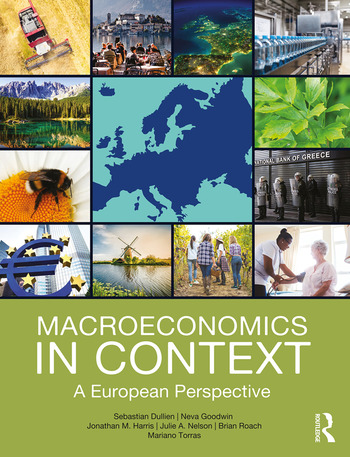Introduction to Macroeconomics
Exploring Economics, 2021
Exploring Economics for Teachers
Exploring Economics collects course descriptions, syllabi and slides so that lecturers can share resources and innovate their teaching.
Share your Syllabus Find more Teaching Material
Introduction to Macroeconomics
This lecture was originally taught at University of Greenwitch, Winter Semester 2019/20
 Based on the textbook: Macroeconomics in Context – A European Perspective
Based on the textbook: Macroeconomics in Context – A European Perspective
Macroeconomics in Context: A European Perspective lays out the principles of macroeconomics in a manner that is thorough, up to date, and relevant to students. With a clear presentation of economic theory throughout, this latest addition to the bestselling "In Context" set of textbooks is written with a specific focus on European data, institutions, and historical events, offering engaging treatment of high-interest topics, including sustainability, Brexit, the euro crisis, and rising inequality. Policy issues are presented in context (historical, institutional, social, political, and ethical), and always with reference to human well-being.
Lecture Summary
This is an introductory level core course in macroeconomics for those expecting to take further courses in economics. It provides a theoretical and applied approach of introductory macroeconomics, with an international perspective and applications to account for the growing importance of the global economy and the rising openness of economies. The course covers critical issues such as macroeconomic stabilization, distributional equity, environmental considerations, and the adequacy of living standards and, while laying down the foundations of the core principles of economic theory and analysis, it contextualises the relevance, applicability and limitations of theories providing a pluralistic view from the macroeconomic perspectives. The course offers abundance of current real-world examples and applications to make theoretical exposition close to experience. Topics will be treated from a theoretical, mathematical and applied standpoint. The contextualisation will recognise the centrality of three current compelling goals of macroeconomics: (1) improvements in living standards, (2) stability and (3) financial, social, and ecological sustainability, relating them to globalization, inequality, the Great Recession and its aftermath. The ultimate objectives are to bridge theoretical and factual knowledge of current economic issues and to gain an understanding of real world events, of macroeconomic policies and of their effects on business and organizations.
Learning Outcomes:
- Explain and understand the context of economic analysis: economic activities, interactions across agents, markets and countries in generating distributing and using resources
- Gain knowledge of methodology and tools of economic analysis, to use macroeconomic measurements (the current approach and the environmental and social dimensions) and to identify the interaction of economics with other social sciences.
- Gain clear insights of different theories, and analytical methods in macroeconomics, and become aware of the importance of the model-based approach to study macroeconomic issues such as business cycles, unemployment, inflation, deficit and debts, international borrowing and lending, inequality.
- Contextualise and apply economic theories to real world factual evidence and current policy issues (such as: financial-social-environmental sustainability issues) and to use quantitative methods and computing techniques relevant to the study of economics
- Distinguish between and evaluate fiscal and monetary policies, explain competently the causes and effects of globalization for consumers, firms and national economies and identify major institutions promoting global trade and development
- Handle and interpret data relevant to the study of economics in the context of international markets.
Find the detailed lecture structure and assessment criteria in the module handbook
There is still so much to discover!
In the Discover section we have collected hundreds of videos, texts and podcasts on economic topics. You can also suggest material yourself!
Discover material
